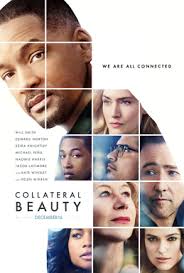Collateral Beauty
Posted on December 14, 2016 at 4:41 pm

With typical understated euphemism, the military calls the damage inflicted on non-target sites and civilians “collateral damage.” Screenwriter Allan Loeb calls his new film a fable and he asks us to consider the possibility of “collateral beauty,” beauty that is revealed only when our pain forces us to pay attention. Emily asked in Thornton Wilder’s Our Town, “Does anyone ever realize life while they live it…every, every minute?” The State Manager answers, “No. Saints and poets maybe…they do some.” This movie would add, “And those who are grieving.”
Howard (Will Smith) is confident, charming, and successful when we first see him, asking his partners and the employees of his advertising agency, “What is your Why?” He is not asking them to participate in a discussion of existential metaphysics and man’s search for meaning. He was asking them to think about how to describe their client’s products to answer the potential customers’ Why questions. Death, Time, Life, according to Howard, are what we grapple with. “We long for love, we wish for more time, we fear death.” Products that help people feel that they have some control over mortality and intimacy are the ones that will sell.
But three years later, Howard has suffered the most shattering loss of all, the death of a child. He sits in his office creating elaborate domino structures and then watching them fall. He’s “the domino champion of crazytown” and the jobs of everyone in the company are at stake.
Howard no longer even speaks to his friends and colleagues, Whit (Edward Norton), Claire (Kate Winslet), and Simon (Michael Pena) and he no longer meets with clients. The business is in trouble. They have one hope — a sale of the company. But Howard will not discuss it, and he controls the majority of the stock.
Desperate, Whit, Claire, and Simon hire a detective (Ann Dowd) to help them build a case that Howard is not mentally stable enough to control his voting shares. She tells them Howard has been writing letters to express his pain. He has written to Death, to Love, and to Time. And so Whit, Claire, and Simon hire three actors to play the roles of Death (Helen Mirren), Love (Keira Knightley), and Time (Jacob Latimore), to answer Howard’s letters. Best case scenario, they make it possible for him to move forward by engaging directly with his questions about life and pain and loss and meaning. Worst case scenario, they document his mental instability so they can override his ability to block the deal.
White, Claire, and Simon each have their own problems, it turns out, and the actors provide some gentle guidance on that as well. And Howard is provoked into responding. Each encounter makes it possible for him to take another step toward re-engaging with the world, including attending a grief support group for parents whose children have died.
I was touched by the film’s willingness to do what it asks Howard to do — to confront death, love, and time and ask what it all means and why it hurts so much. Its heartfelt sincerity and lovely performances beguiled me into its world. It is worth seeing for Mirren’s exquisitely witty turn alone. She is clearly having a great time playing the part of a Capital R Theatrical Capital-A Actress. Norton is also excellent, especially in scenes between Whit and his tween daughter who is furious at him for cheating on her mother. Naomie Harris as the leader of the support group has a sweet gravity that is as important to bringing some grounding to Howard as his conversations with the embodiment of abstract concepts. And Smith brings all of his full-out charisma to the role of a man who cannot figure out how to go on when he has lost everything that matters because his view of the world has been shattered into sub-atomic particles and nothing makes sense. Howard has become a man who spends days adjusting the precise placement of elaborate domino structures and then knocks them down and leaves the room without watching the way they knock each other down.
The raw elements of Smith’s acting anchor the more fanciful and symbolic elements of the story, tenderly told, with a conclusion of warmth, healing, and perhaps some connection to a fourth spirit, hope.
Parents should know that this film includes themes of loss and devastating grief, including death of children, and a few swear words.
Family discussion: If you wrote letters to Time, Death, and Love, what would you say? What other concepts would you write to? What is collateral beauty, and does it take a profound loss to be able to see it?
If you like this, try; “Our Town,” “Truly, Madly, Deeply” and “The Pursuit of Happyness”
